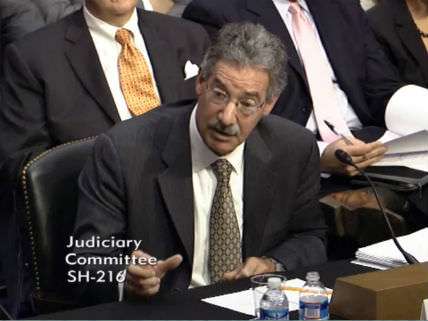Feds Have No Viable Legal Strategy to Overturn Marijuana Legalization, Deputy A.G. Concedes

Testifying today at the first congressional hearing on marijuana legalization in Colorado and Washington, Deputy Attorney General James Cole conceded that the Justice Department does not have a solid legal basis on which to challenge those states' new laws. "It would be a very challenging lawsuit to bring," Cole told the Senate Judiciary Committee, because repealing state penalties for growing, possessing, and selling marijuana does not create a "positive conflict" with the Controlled Substances Act. Cole argued that the feds might be on firmer ground if they tried to pre-empt state licensing and regulation of newly legal marijuana businesses. But if such litigation were successful, he said, it could make the situation worse by leaving the industry unregulated. That is why the Justice Department settled on the approach summarized in the memo that Cole issued on August 29, limiting its enforcement efforts to cases that implicate eight federal concerns, including sales to minors, drugged driving, and diversion to other states. If Colorado and Washington do not adequately address those issues, he said, "We have reserved quite explicitly the right to go in and pre-empt at a later date." He summarized the department's policy as "trust, but verify."
Sen. Sheldon Whitehouse (D-R.I.) welcomed Cole's memo as a clarification of the Obama administration's shifting, inconsistent policy on medical marijuana, which began with assurances that state-legal suppliers need not worry about federal prosecution. Those promises of tolerance were followed by letters from U.S. attorneys who said compliance with state law would not provide protection to anyone but patients. Cole sought to gloss over the contradiction in a 2011 memo that said caregivers also are protected, but businesses serving patients are fair game. "This was a mess," Whitehouse observed, pressing Cole to say whether state-approved marijuana growers and suppliers can now rest easier. "As long as they are not violating any of the eight federal priorities," Cole replied, "the federal government is not going to prosecute them." In case those eight priorities do not leave enough room for prosecution, he added, U.S. attorneys may decide to target state-legal cannabusinesses for other, unspecified reasons, as the last sentence of his latest memo indicates: "Nothing herein precludes investigation or prosecution, even in the absence of any one of the factors listed above, in particular circumstances where investigation and prosecution otherwise serves an important federal interest." Although Cole said that "catch-all" is "not meant to swallow the entire memo," it is clear that prosecutors have a great deal of leeway in deciding whom to target. The real significance of this alleged policy shift will hinge on the actions of U.S. attorneys in states that allow medical or recreational use of marijuana, several of whom already have said the new directive will not affect their work.
In addition to promising prosecutorial restraint, Cole said the Justice Department is working with federal regulators to allay banks' fears of dealing with marijuana businesses, which often operate on a cash-only basis because financial institutions are reluctant to accept their deposits. "We agree it is an issue we need to deal with," he said in response to a question from Senate Judiciary Committee Chairman Patrick Leahy (D-Vt.). "There is a public safety concern when businesses have a lot of cash lying around." On a related issue, Cole denied reports that the Drug Enforcement Administration had warned armored-car services not to do business with marijuana merchants. "DEA was merely asking questions of the armored car companies as to what their practices are," he said, adding that the "questions" came before his memo. As for the inability to deduct business expenses on federal tax returns, another financial headache that marijuana enterprises face, Cole said Congress will have to address the problem through legislation.
The other witnesses at the hearing included King County, Washington, Sheriff John Urquhart, who supported marijuana legalization in his state. "My experience has shown me that the war on drugs has been a failure," Urquhart said. But he added that "I don't see a huge conflict" between state and federal goals, noting common interests in child protection, traffic safety, and keeping marijuana profits out of criminal hands. Kevin Sabet, director of the prohibitionist group Project SAM (Smart Approaches to Marijuana), warned that "we are now on the brink of creating Big Marijuana," which will make money by targeting minors and creating addicts. Sadly, he said, "American-style legalization is commercialization," which means cannabis-infused gummy bears that appeal to children and Internet advertising that will be seen by teenagers.
In response to such concerns, Jack Finlaw, chief legal counsel to Colorado Gov. John Hickenlooper, noted that the final version of his state's marijuana regulations, unveiled yesterday, includes a ban on TV, radio, print, and online ads for cannabis without "reliable evidence" that at least 70 percent of the audience is 21 or older. As I have explained, such restrictions are vulnerable to challenge on free-speech grounds. Finlaw conceded that "we have First Amendment issues to grapple with as we try to restrict advertising." Urquhart took a different tack, assuring Sabet that "big business is not going to take over the marijuana business in the state of Washington," because "there is no vertical integration allowed." In Colorado, by contrast, vertical integration is required, but that rule also supposedly will help prevent underage consumption.


Show Comments (43)